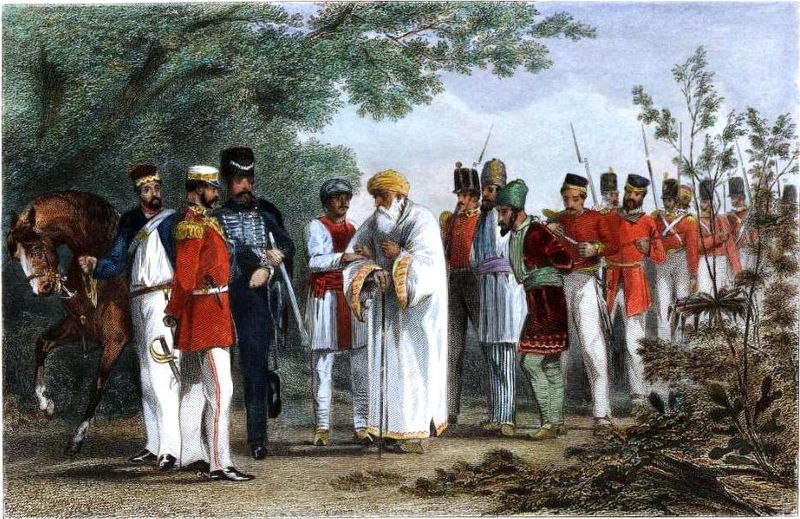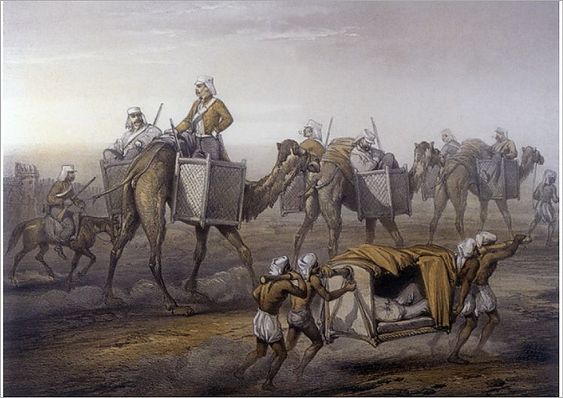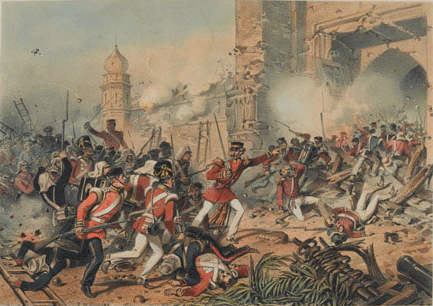The reasons of defeat
Translation series of “Heroes of 1857”, by Sayyada Anees Fatima, Episode X (First Ed., 1949)

William Hudson at Humayun’s Tomb on 20 September 1857, Pic source: Wiki Images
One of the biggest reasons for the sad end of above mentioned sacrifices was the devastation of that magazine ( arms depot) which turned the success into failure and victory into defeat. Syed Mubarak Shah who was chief warden of Delhi city during the struggle for freedom narrated, the Naseerabad platoon carried out a spectacular attack and their artillery got closer to British bunkers. But Hakeem Ahsan Ullah Khan intentionally delayed dispatch of critical supplies and weapons, that resulted in rebels to retreat. Mubarak Shah added, if Rebels had been successful then they would have moved their artillery forward and paved their way through British rank & file.
Zaheer Dehlvi wrote, “Another calamity occurred that the seven hundred maunds ordinance was kept in the Magazine (Arsenal) located at Mansion of Begum Samru. A blast was heard, I climbed up my two floors and witnessed plumes of smoke and dust rising towards the sky, then it was known that Magazine had blasted. Due to non supply of ordnance all weapons of war became redundant. There was no hope of outside help while the enemy was at the gates. The King was already getting weak hearted and desperate as one of his close confidante Mirza Ilahi Baksh left the fort and took refuge at Emperor Humayun’s tomb’’.

Melson wrote, ‘’The same night, Bakht Khan, the commander of the rebel forces, retreated from the city and also took his most trusted fighters with him.Bakht Khan made an earnest request to the King to come along with him as he has much to do. Although Britishers have captured the fort but the doors of his country are still open and in the name of the King it is possible to keep the war of resistance alive and there are chances of success’’. If Bahadur Shah’s nature had the similar steadfastness and endurance like his ancestors Babur, Humayoun, Akbar and Alamgir then the request of Bakht Khan would have not gone in vain. Except Feroz Shah, all other Princes followed the King and took refuge at Humayun’s tomb.

The disappearance of General Bakht Khan
The battery of ordnance was finished. The King left the fort and the result was obvious. General sahib along with his forces left for Lucknow and by the time he reached he was left with five thousand troops, thirty three women and few odd people of Delhi and Farrukhabad. Due to close relations he stayed at Khuld Manzil of Sultan Bahu Sahiba. Hazrat Mahal also accorded General Bakht Khan a warm welcome. Besides the invitation she sent him Rs. five thousand, vestment and handkerchief. General sahib formed a bunker at Jalalabad (Distt. Hardoi) but after some time he realized that the friction between rebel leaders and internal treason is quite strong. The painful fate suffered by Delhi is soon to befell upon Lucknow. Thus one day he suddenly disappeared. For many years inquisition and search remained underway but neither this brave and upright General was found nor he was supposed to be found. Many were under the impression that he migrated to Mecca but it does not sound true because people saw Feroz Shah and Tajjamul Hussain over there but no one saw Bakht Khan. Some say that he departed to the Independent frontiers (now settled areas of KPK Province of Pakistan) and co-worked with the native tribes against Britishers. But God knows whether it was true or not. His biggest political mistake was to lead the rebellion while keeping the King on the throne which resulted in utter failure. Khawaja Hasan Nizami wrote, ‘’Poor Bakht Khan had to bear the burden of facing two adversaries, one were Britishers and other was Mirza Mughal. During these struggles his forces got out of control. Administrative body was rendered useless. Britishers captured Delhi and the scheme of rebellion went up in the air’’. When British troops were entering the city, Maulvi Sarfaraz Ali and Maulvi Faiz Ahmed, close aides of General Bakht Khan went to the King and requested him to lead the decisive charge of the rebel army and citizens of Delhi against the British forces but the King (Bahadur Shah Zafar) exhibited hesitancy. At this point they said that when Englishmen are going to capture you folks they will give you a humiliating death. So what is the use of dying an embarrassing and shameful death. Upon hearing this, the King responded that in the afternoon he will lead the attacking rebel army. When the general public heard this news, stream upon stream of people started gathering to die for their King. At this juncture, Hakeem Ehsan Ullah Khan stated to the King that British forces had reached the houses nearby the Fort, if you were targeted and I also became a target then later how I will be able to request a referral to Britishers for you ? Upon hearing this the King went back inside the fort and said that now it is time for Zuhr prayers. When the plan of attack turned to total failure , the rebels got dispersed.Britishers initiated attack and started shelling the Fort and Walled city. Same night the King escaped by boat from the south gate of the fort which was in the direction of Yamuna River and took refuge in Humayun’s tomb. King Bahadur Shah sent a communique to Bakht Khan, from Humayoun’s tomb, to dispatch two hundred soldiers for safety sake. So at 3:00 am on 20th Sept 1857 under the command of Maulvi Noordad Ali when the rebel soldiers were tightening the reins of their horses the other soldiers of the regiment got suspicious and felt that something was wrong so the other soldiers also started preparation. When they saw Bareilly brigade leaving they also followed suit. Pandemonium broke out as everyone left their belongings and left for Humayun’s tomb with their weapons only. General Bakht Khan and Risaldar Muhammad Shafi came to the King and requested him to come along with them across Yamuna. King agreed but then the magic of Hakeem Ehsan Ullah Khan tricked him not to go and General Khan failed to take the King alongside him. The mighty purpose, for which General Bakht Khan and other comrades put their lives at stake, was for the lasting freedom of Hindustan. But when a nation gets enslaved due to its own follies then it becomes very difficult to break the shackles.History of free nations bore witness to this fact. However, the rebellion of 1857 can not be declared a complete failure. After that the effects of this struggle (of 1857) started showing on the state of affairs as the Company’s (EIC) autocratic rule and cruel governance ended. British Parliament took the powers in their hands. The determination of the rights of natives and the responsibilities of officials at helms initiated. The ground for non violent democratic struggle for freedom opened up instead of armed struggle. Today we see that the war which could not be won by the use of arms was turned into a momentous victory over Britishers through thoughtfulness, endurance, perseverance, selflessness and sacrifice by those who came after. It was such a magnificent victory that history is unable to present such an example. In this war the resources and weapons were different but the spirit and emotions were the same which emboldened the hearts of Hindustanis and rallied them to stand tall in the battlefield during 1857 ready to lay their lives. May God Almighty shower his blessings on those pioneers who struggled for the motherland.
بنا کر دند خوش رسمے بخاک وخون غلیدن
خدا رحمت کندایں عاشقان پاک طینت را
With hard toil they set beauteous traditions /
May God shower his blessings upon such lovers of pious people
Rebellion Movement (From the eyes of fair minded Englishmen)
From the above mentioned events the extent of sacrifices and hardships of our elders is known. But the question is what high and mighty objective was in front of them to do all this. Some fair minded Englishmen wrote about them which will not be inappropriate, ‘’ If any rebellion can be called righteous then it was the rebellion of the Muslims of Hindustan’’
‘’ They participated in the rebellion with no mean objective’’.
Dr. Hunter
‘’ I have no shame to mention that this rebellion was not just because of nationalistic pain and anguish, instead in the background there was general sense of political frustation in its support which risen them”.
Mr. Benjamin Disraeli, Prime Minister of Britain (1874-1880) during his speech on 27th July 1857.
Majendy wrote, ‘’ Majority of those who we arrested were finished at the same time but until their last moments their faces bore signs of valour and self control’’.
A befitting dedication to the unheralded Heroes of a lost battle, General Bakht Khan Rohilla, and his comrades.
ڈھونڈوگے اگر ملکوں ملکوں ملنے کے نہیں نایاب ہیں ہم
جو یاد نہ آئے بھول کے پھر اے ہم نفسو وہ خواب ہیں ہم
میں حیرت و حسرت کا مارا خاموش کھڑا ہوں ساحل پر
دریائے محبت کہتا ہے آ کچھ بھی نہیں پایاب ہیں ہم
This is a translation series of Urdu account by Sayyada Anees Fatima titled “Jang-e- Azadi (Awwal)’57 kay Hero” (Trans. Heroes of the First War of Independence). It was first published in 1949 at Aligarh under the aegis of All India Muslim Educational Conference (A movement founded by Sir Syed Ahmed Khan). The author captured the melancholy, conflicts of Indian states with East India company & struggle of 1857 in a vivid story telling style integrated with contextual Persian & Urdu Poetry. The translation & contextualization is done by Sayyad Asad Ali (her grandson) & edited by Saba Saif.
Syed Asad Ali is Lahore based branch head for a Japanese company that develop large scale Industrial Projects. Reading & writing are his favorite hobbies. His fathers family hails from Bareilly, UP & maternal side was from Kishangarh, Rajasthan. He is an avid follower of pre-partition history of India.

